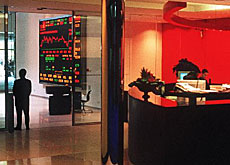Interest rate fears lead to stock market volatility

The Swiss and United States stock exchanges have been plagued by fears about rising interest rates, the price of oil and the conflict in Iraq.
Both bourses rose in the first quarter of the year but fell back during the second, despite an improvement in the economy.
The benchmark Swiss Market Index (SMI) grew throughout 2003 and continued to do so until the end of the first quarter, climbing from 4,700 points in July to more than 5,900 points in March.
But it then abruptly lost ground, falling back to 5,400 points – practically the same level as at the end of the year.
“At least the SMI developed more positively than the Dow Jones Industrial during the first half of the year, which is the reverse of what happened in 2003,” Lorenz Burkhalter of Burkhalter Asset Management told swissinfo.
Economy improves
Since the middle of March, the negative trend at the stock exchange has been running counter to that of the global economy, which has been steadily improving.
While economic indicators are pointing upwards, the markets have reacted to the threat of interest rate rises and ongoing concerns about political instability in Iraq.
But returns from long-term bonds have bucked the trend and moved in the opposite direction.
Ten-year benchmark bonds fell in the first quarter to 2.25 per cent, but have since made up lost ground to reach the three per cent mark.
Interest rates
Earlier this month the Swiss National Bank (SNB) unexpectedly raised its key interest rate, signalling its conviction that economic recovery is gathering pace.
The markets are also bracing themselves for a rise in interest rates in the US, which are currently at their lowest level since 1958.
Later this week Federal Reserve chairman Alan Greenspan is expected to announce the first rate rise in four years.
On the currency exchange market, the euro declined against the Swiss franc over the first six months of the year from a high of SFr1.58 to a level of SFr1.50.
The dollar fell to SFr1.25 against the franc at the beginning of the year. It recovered to around SFr1.30 in the first quarter but has since fallen back.
Annual statements
While the annual results of companies listed at the stock exchange were largely positive, this did not translate into a rise in share prices.
Switzerland’s two largest banks, UBS and Credit Suisse, presented record results but still saw their share prices fall.
“In the chemical branch and in industry in general, the first half of the year presented a mixed picture. Nothing much happened in the whole branch, and as far as shares were concerned, it was a game of zero sums,” said Burkhalter.
Swiss pharmaceutical giant Roche was one name that shone in the first half of the year following the success of a cancer drug made by one of its subsidiaries.
Negative headlines
But negative headlines at the bourse were caused by the Adecco employment agency, which lost the goodwill of the market when it was unable to publish its annual results on time.
No serious accounting errors were found at the company, but the delay was widely seen as a public relations disaster.
The share price of the country’s national airline, Swiss, also suffered during the first half of the year.
The resignation of CEO André Dosé in March, ongoing talks with banks about a new credit facility, the hasty sale of fuel hedges and a recent profit warning have all helped to push down the value of the company’s stock.
There were positive results from cement producer Holcim, thanks in part to increasing demand for cement in the emerging markets, particularly in Asia.
Presidential election
Analysts will be watching the bourses during the second half of the year to see what impact this year’s US presidential election will have on stocks and shares.
“When the markets are doing well, the chances of re-election for the incumbent president grow,” said Burkhalter.
Credit Suisse is optimistic about developments at the stock exchange and predicts that the SMI will stand at between 6,000 and 6,200 points by the end of the year.
Economist Beat Kunz at UBS is more sceptical, forecasting a level of 5,900 points.
swissinfo, Alexander Künzle
The chairman of the United States Federal Reserve, Alan Greenspan, is expected to announce an increase in key interest rates on Wednesday.
American investors have been fearing such a move since the beginning of the year.
The Swiss National Bank raised its key interest rate 11 days ago.

In compliance with the JTI standards
More: SWI swissinfo.ch certified by the Journalism Trust Initiative













You can find an overview of ongoing debates with our journalists here . Please join us!
If you want to start a conversation about a topic raised in this article or want to report factual errors, email us at english@swissinfo.ch.